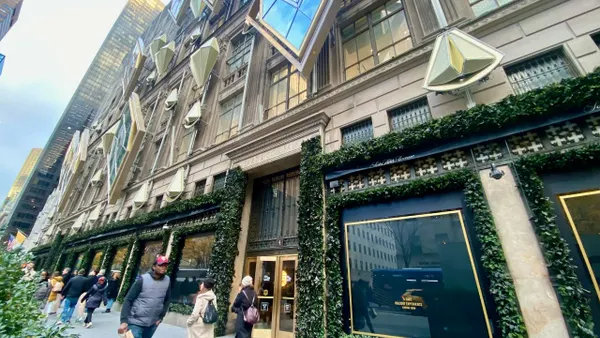Dive Brief:
-
As many consumers continue to avoid indoor shopping due to the pandemic, and without e-commerce to make up for that, Ross Stores in a press release Thursday reported that third quarter total sales fell 2% to $3.75 billion.
-
Store comps declined 3%. After opening 30 Ross and nine dd's Discounts stores in the period, the company ended with 1,869 stores, up from 1,810 a year ago, and has completed its expansion for the year, CEO Barbara Rentler told analysts Thursday, according to a Motley Fool transcript.
-
The off-price retailer was in the black in the quarter, though net income tumbled 65% to $131 million from $371 million a year ago. The decline in part was driven by a one-time $240 million charge from refinancing $775 million in senior notes, per the release.
Dive Insight:
Many consumers in general may be avoiding brick-and-mortar stores as the pandemic resurges across the U.S., but they don't seem to be avoiding Ross stores. The off-pricer apparently coaxed shoppers even in hard-hit areas.
"Interestingly, the Midwest, where Covid spikes were perhaps most notable, performed the best in 3Q, which we wouldn't have expected; tourist and border-markets such as FL and TX performed below the chain," MKM Partners Managing Director Roxanne Meyer said in emailed comments.
As at many other retailers these days, inventories were slim, down 25% in the quarter. Sales picked up after August, Rentler said in a statement, due to merchandise assortment improvements, a late back-to-school season, better performance in those larger markets and a return to "more normal store hours."
The 3% comp decline bested analyst expectations and edged out rival TJX, which Credit Suisse analyst Michael Binetti attributed to Ross's lower average price point. That August comps were down 12% suggests they were positive in September and October, Binetti also stated in emailed comments. Comps in November have decelerated, but Binetti dismissed that as "short term noise" likely due to the presidential election and the worsening pandemic.
The strong quarter reflects the endurance of off-price retail in general, but Ross tends to have more of the casual clothing in demand right now, plus offers home goods, according to a client note from GlobalData Retail Managing Director Neil Saunders.
"Set against the context of an incredibly weak apparel market, the results are quite remarkable," Saunders said. "And, after a slower start, Ross has quickly played catchup with TJMaxx and Marshalls and has now, in growth terms, overtaken its two rivals."
Despite the show of strength ahead of the holidays, the season won't necessarily be smooth sailing for Ross. The pandemic appears to be spiking in many areas, and several governors have begun to take steps toward further lockdowns, a situation that has worried nonessential retailers as they entered the holiday period. Even if stores aren't forced shut as they were earlier in the year, anxiety about shopping in stores could escalate. Ross has eschewed e-commerce, so it doesn't offer the curbside pickup and other BOPIS services that consumers have come to expect from stores.
"With no online proposition, any large scale shut down would deplete revenue as happened during the first lockdown – although the impact may be sharper given the usually elevated sales of the holiday quarter," Saunders said. "Longer term, Ross is in a good position."
Ross will be aided in that long term not just by the long-anticipated end of the pandemic, but also by the market share opportunity arising from retail's many closures and bankruptcies.
"[Ross] remains a preferred retail reopening play, with inventory flows improving, a strong value message, unprecedented competitor store closures ahead and flexibility to pivot its store framework quickly over the next year," Binetti said.














